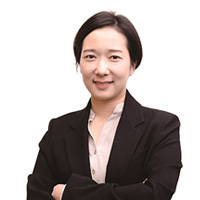Stedelijk Museum collects media works by two Korean artists
By Park YunaPublished : April 4, 2024 - 17:18

Stedelijk Museum in Amsterdam has acquired two media artworks by Jun So-jung and An Jung-ju, jointly marking the first acquisitions from a Korean artist since video art founder Paik Nam-june’s work for the museum’s collection.
“We were one of the first museums in Europe to start a video collection and time-based media collection. We started that in the 1970s and built up quite a big collection -- about 2,000 time-based-media works in total," Rein Wolfs, director of the museum, told The Korea Herald. The museum holds more than 100,000 art works.
The museum has acquired 11 works by Paik, commencing the collection in 1978.
The new acquisitions are part of the program “Songeun x Stedelijk: Video Club,” which aims to show the museum’s time-based media collection at Songeun Art Space in Seoul. Premiering in Korea in October 2023, the program that consists of four exhibitions featuring four to 10 works for each session continues throughout this year.
“For us, it is interesting to show it in another museum and in another context because we all have our own context,” the director said.

The Stedelijk Museum’s acquisition of Jun’s “Despair to be Reborn” and An’s “Their War 2 – Israel” was made possible through a partnership with Saint Laurent Korea. The museum selected two media works by Korean artists shown at Songeun Art Space, facilitated by a donation from Saint Laurent Korea.
Jun is the grand prize winner of the 14th SongEun Art Award, while An is an awardee of the 17th Songeun Art Award.
In the five-minute “Their War 2 – Israel,” An captures images and sounds of the barrier between Israel and Palestine, presenting it as one observation among many unique cultural gestures encountered during the travel.
Jun delves into questions and experiments about perceiving the present through the lens of the past within the flow of history. She created a 24-minute digital work inspired by Korean poet Yi Sang’s poem “Au Magasin de Nouveautes” where Yi analyzes the structure of a modern department store from an architectural standpoint, expressing it in his distinctive language.





![[Herald Interview] How Gopizza got big in India](http://res.heraldm.com/phpwas/restmb_idxmake.php?idx=644&simg=/content/image/2024/11/20/20241120050057_0.jpg&u=20241120164556)


![[KH Explains] Dissecting Hyundai Motor's lobbying in US](http://res.heraldm.com/phpwas/restmb_idxmake.php?idx=644&simg=/content/image/2024/11/20/20241120050034_0.jpg&u=)
![[Kim Seong-kon] Farewell to the vanishing John Wayne era](http://res.heraldm.com/phpwas/restmb_idxmake.php?idx=644&simg=/content/image/2024/11/19/20241119050096_0.jpg&u=)
![[Graphic News] 70% of S. Koreans believe couples can live together without tying the knot: survey](http://res.heraldm.com/phpwas/restmb_idxmake.php?idx=644&simg=/content/image/2024/11/19/20241119050098_0.gif&u=)







![[Today’s K-pop] Blackpink’s Jennie, Lisa invited to Coachella as solo acts](http://res.heraldm.com/phpwas/restmb_idxmake.php?idx=642&simg=/content/image/2024/11/21/20241121050099_0.jpg&u=20241121172748)